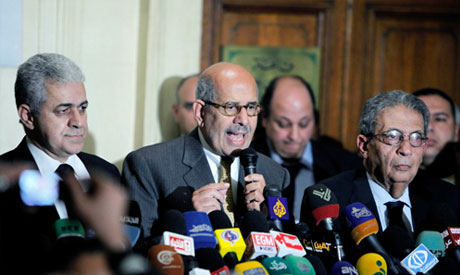 Egypt's National Salvation Front (NSF), a coalition of opposition parties and groups, rejected on Monday an invitation by President Mohamed Morsi to hold talks aimed at resolving the current political crisis.
Egypt's National Salvation Front (NSF), a coalition of opposition parties and groups, rejected on Monday an invitation by President Mohamed Morsi to hold talks aimed at resolving the current political crisis.
At a press conference held at Wafd Party headquarters in Cairo, the NSF – in a statement read out by NSF co-founder and Constitution Party chief Mohamed ElBaradei – rejected Morsi's proposed dialogue as a "facade" and stressed that certain conditions needed to be met in order to guarantee a "serious dialogue".
"We are not against holding talks, but we will not let the Egyptian people down by engaging in fake dialogue," ElBaradei said.
"Many missteps have led to the current situation…security measures will not solve the current crisis, but a political solution must be found," he added.
NSF members who attended the conference – including former presidential candidates Hamdeen Sabbahi and Amr Moussa, along with Wafd Party chief El-Sayed El-Badawi – said they would soon unveil their "conditions" for dialogue.
The NSF had earlier proposed five demands that it said were necessary for national consensus.
"We met with Morsi earlier, and all we got from the meeting was a dictatorial constitutional declaration," said Sabbahi. "The second dialogue meeting did not accomplish anything either."
Sabbahi went on to demand that the president "acknowledge his responsibility" for the bloodshed, admit the legitimacy of the "people's demands" and respect peaceful protests. He further demanded that interior ministry and security officials be prosecuted for using excessive force to disperse recent demonstrations.
The opposition front also stressed its commitment to the revolution, saying it would "engage in any actions that would lead to the realisation of revolutionary goals". It went on to claim that it would only employ peaceful methods and condemned all forms of vandalism and violence.
NSF leaders also denied they had plans to form a "presidential council."
The NSF also stressed its solidarity with the people of Port Said, Ismailia and Suez, adding that they would not tolerate the "isolation" of the three canal cities.
Clashes have been ongoing between police and protesters in the three cities since Friday, which marked the second anniversary of Egypt's January 25 Revolution. More than 40 people have been reported killed in the violence.
The death toll rose dramatically in Port Said when a court on Saturday sentenced 21 Port Said residents to death for their involvement in last February's Port Said stadium disaster, in which scores of football fans were killed. Since then, the city has witnessed intense rioting, with residents accusing the central government of scapegoating and marginalising them.
Intermittent clashes remain ongoing in Cairo, Damanhour and Alexandria. The nationwide death toll is now estimated at more than 50 with hundreds more injured. At least 296 protesters have been arrested since Friday, according to security sources.



